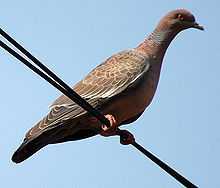Asa Branca

"Asa Branca" is a song written by Luiz Gonzaga and Humberto Teixeira in 1947. It has been covered by Zé Ramalho in his 2003 album Estação Brasil. It is about the droughts that often afflict the sertão of the Brazilian Northeast.[1]
The asa-branca ("white wing") of the title is the picazuro pigeon.[2] With its departure the desolation of the parched sertão is complete, and the protagonist of the song, unable to make a living, must leave the sertão and his lady-love Rosinha. The song closes with his promise to return.[1]
The song was voted by the Brazilian edition of Rolling Stone as the 4th greatest Brazilian song.[1]
A Volta da Asa-Branca
"A Volta da Asa-Branca" is a sequel to "Asa Branca". It marks the return of rain, the asa-branca, and the protagonist to the sertão. The song celebrates the return of life to the sertão, and the protagonist's reunion with Rosinha, whom he plans to marry at the end of the year.
References
- ↑ 1.0 1.1 1.2 Angelo, Assis (2009). "As 100 Maiores Músicas Brasileiras - "Asa Branca"". Rolling Stone Brasil (in Portuguese). Spring. Retrieved 6 January 2014.
- ↑